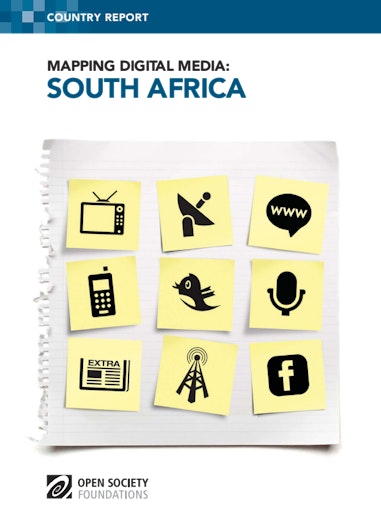The Mapping Digital Media project examines the global opportunities and risks created by the transition from traditional to digital media. Covering 60 countries, the project examines how these changes affect the core democratic service that any media system should provide: news about political, economic, and social affairs.
Developments in digital media in South Africa are densely intertwined with political factors. The government has sought to be the driver of digitization, but it has also caused repeated delays in digital roll-out. In addition, the government has had contradictory interests such as promoting competition while also favoring large enterprises in which it has controlling or monopoly shares.
The challenges are very great in terms of bringing access to digital benefits across a large landmass, in which more than a third of people live in rural areas, even more are too poor to be an attractive market for advertisers, and where diverse people use more than 12 mother tongues. In the absence of success by the state in promoting digitization, the media system remains mainly mainstream and analog, apart from the rapidly growing business of digital satellite pay-television. Radio has the greatest reach in society and, within this sector, community radio is making strides. Pluralism of ownership and an increase in broadcasting stations has occurred, but by using analog rather than digital means. Print is shrinking in terms of sales, although its share of advertising has been holding up.
Digitization is therefore unfolding in an environment which will continue to determine its characteristics. It is unlikely to facilitate major change in media and news, although it can be expected over time to expand choice and enable new entrants, on a scale that will attract—but also limit—attempts at political control.
Download
-
Mapping Digital Media: South Africa (551.98 Kb pdf file)
Download the complete 120-page report.
Read more
Voices
What Does Independent Journalism Look Like in the Digital Age?

Journalists and media organizations can find themselves repressed because of inadequate or deliberately repressive policy. Mapping Digital Media examines the situation in 56 countries.
Voices
Early Days for Digital Media in Morocco
Digital media in Morocco continues to advance. With 105 percent mobile phone penetration in the country and a growing appetite for online news more change is on the way.
Voices
Mapping the Brave New Digital World
A series of reports investigates how the growth of digital media is affecting journalism and democracy in 60 countries.
